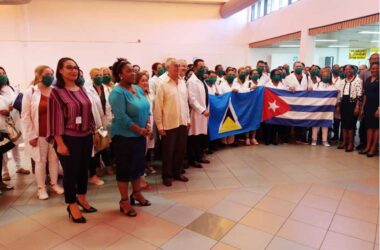This year’s Labour Day celebrations was highlighted with a striking amalgamation of government officials and trade union representatives rallying for better working conditions and the general welfare of workers in the country.

Prime Minister Philip J Pierre called for more recognition to be given to trade unionists and the overall “Labour Movement” as workers across the board gathered, Monday, in celebration of Labour Day (May Day).
Pierre spoke about the exploits of stalwarts like Sir GFL Charles, Sir John Compton, Charles Augustin, Herman Collymore, Martin “Oleo” Jn. Baptiste, Burke King, Sir Calixte George and others down to the present day of younger trade union leaders.
He also indicated that plans are in the making to implement an equitable living wage for employees in all sectors.
The respective entities made a commitment to work in tandem with government in seeking to level the playing field for employees.
“The celebration (today) is a historic celebration, which started in the 1880s and it was as a result of these struggles that there was a Moyne Commission that spoke of the Rights of Workers and it led to the strikes and the formation of the Trade Union Movement,” PM Pierre told an attentive audience.
He recalled that in the mid-1900s workers in Saint Lucia and the wider region experienced “terrible working conditions”, which subsequently, gave rise to the trade union movement.
Nonetheless, he said, the challenges that existed at the time, stills persists presently with issues such as, food prices, inflation, occupational health and safety “and it’s our role as government to see how we can combat and how we can diminish these crises”.
Noting the need for documentation of Saint Lucia’s trade union struggles to liberate workers of the country, PM Pierre asserted; “I want to challenge the younger members of the union to write the history …I challenge the union to do some serious research on the history of Saint Lucia, the history of trade union movement, the history of the struggles of the Saint Lucian people, the history of the value and the worth of Saint Lucian workers.”
He said that despite the “hard fiscal” times currently being experienced, government would support this initiative, if undertaken thoroughly and effectively by the union representatives, to present a booklet on the compilation of the history of Saint Lucia’s Trade Union Movement .
With reference to prevalent gang warfare in the country, the prime minister stated that such documentation is essential to also help guide the people of this nation and in particular, the younger generation in gaining knowledge of “who we are and where we came from”.
“We need to re-educate our young people, particularly in these times …and when we speak about the gangs and the violence, I feel it is because our young people have not understood their value,” PM Pierre added. “Our young men have not understood their value, what they can do, and how they can aspire.”

Labour Minister Dr. Virginia Poyotte underlined the theme for the occasion: “Embracing Fundamental Principles and Rights at Work for Greater Productivity”.
She reiterated that it was not solely the rights of employees that was at stake, but also “we have to stress responsibility”.
Referring to PM Pierre‘s Budget delivery, Dr. Poyotte stated that, “At the core of the value system is the fundamental belief in social justice and wealth creation …a belief that every man, woman and child should have an opportunity to reach their full human potential.”
Recalling the early struggles of vibrant trade unionists, at the time, Dr. Poyotte noted that the ruling St Lucia Labour Party (SLP) was founded on the shoulders of these pioneers of the ‘Labour Movement’, “to open doors of opportunities for every Saint Lucian, irrespective of their social/ economic standing in the society”.
She added: “We must continue to build a society where free enterprise can flourish and that the rights of workers are protected and they can get a fair day’s wage for a fair day’s work.”
In reviewing government operations, Dr. Poyotte pointed to a major component lacking within the Public Service, which she referred to as the ‘Key Performance Indicators’.
“It’s very difficult to measure some of the performances of some of our workers and when we introduced Key Performance Indicators , that’s the only way you can hold people responsible as to how they are performing or whether they are not performing,” she explained.
Dr. Poyotte notes that government is the largest single employer in the country, with at least 10, 000 employees on its pay roll.
She added that while other businesses operate to generate profit, on the other hand, “Government is seen as an employer , but not to generate profit , it is to provide quality service …and if the public is complaining that the service is not up to standard then we will know that our profit is not there.”







![Amy Stephen [Photo credit: Community Tourism Agency]](https://thevoiceslu.com/wp-content/uploads/2026/01/Amy-Stephen-feat-380x250.jpg)





